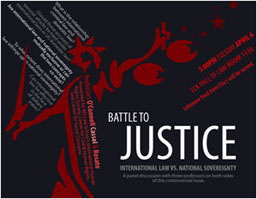
As the world becomes more interdependent, attention turns to the scope and importance of international law and its relationship with national sovereignty. On Tuesday, April 6, Notre Dame Professors of Law Douglass Cassel and Mary Ellen O’Connell, along with Assistant Professor of Political Science Sebastian Rosato, will explore this controversial issue and propose answers to some of its most critical questions. The event takes place from 5-6:30 p.m. in room 1130 of Eck Hall of Law.
The discussion will address complex problems such as the relationship between international criminal law and domestic law; whether those accused of terrorist attacks should be tried under international laws or US domestic law; and the extent to which international law infringes upon national sovereignty?
Douglass Cassel is director of the Center for Civil and Human Rights and a renowned scholar in the areas of international human rights, international criminal law, and international humanitarian law. His research interests include international law options for combating terrorism and strengthening international human rights institutions.
Mary Ellen O’Connell chairs the International Law Association’s Committee on the Use of Force and is vice president of the American Society of International Law. She focuses on international legal regulation of the use of force and conflict and dispute resolution. O’Connell is particularly interested in modes of enforcing international law and the possibility of a classical revolution in international law theory.
Sebastian Rosato is an assistant professor of political science and co-director of the Notre Dame International Security Program. He specializes in international relations theory and international security. His current research focuses on the rise and fall of international institutions.
The presentation is sponsored by the Law School’s International Human Rights Society, the Center for Civil and Human Rights, and the Center for Social Concerns